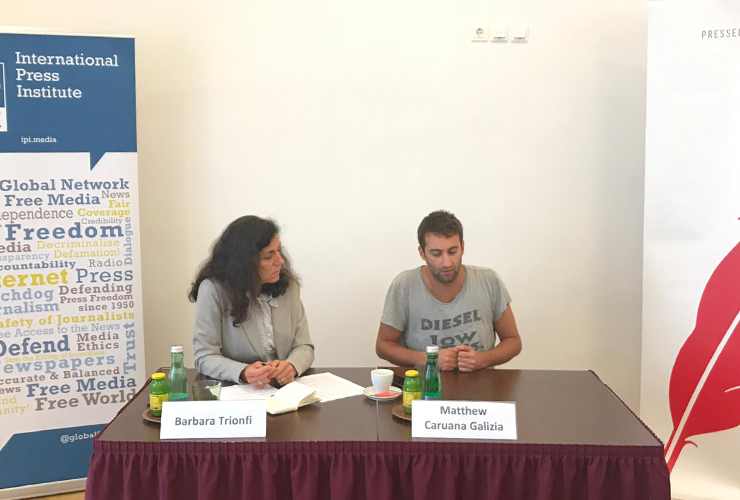Matthew Caruana Galizia, son of journalist Daphne Caruana Galizia who was killed almost two years ago by a car bomb in Malta, today called for greater international pressure for an independent inquiry into his mother’s assassination.
Speaking today at a press conference in Vienna with International Press Institute (IPI) Executive Director Barbara Trionfi, Caruana Galizia, a Pulitzer-Prize-winning journalist, told journalists that European oversight and an independent and impartial examination of the case was the “only route” to the truth. On Oct. 16, 2017, Daphne Caruana Galizia, a leading Maltese investigative journalist, was assassinated in a car bomb attack close to her home in Bidnija, sending shock waves around Europe and leading to international condemnation and demands for justice.
However, almost two years after the brutal killing, investigations have stalled, the three men accused of planting the explosive device have not gone on trial and Maltese authorities have failed to identify who ordered the assassination.
Following pressure by the Council of Europe, the Maltese foreign minister announced in July that the government will launch a public inquiry into the murder of Daphne Caruana Galizia. As the deadline for Malta to announce the public inquiry is September 26, concerns have been raised not only about possible delays in such inquiry, but also about the actual independence of those nominated to lead the inquiry.
“However, such an inquiry could go one of two ways: either it could help us find justice, or it could turn into a whitewash by the Maltese government, who have a vested interest in keeping things closed”, Matthew Caruana Galizia said at the press conference. “This is why we need the international community to put more pressure on the government of Prime Minister Joseph Muscat to make sure the investigation is transparent and independent.”
While praising the decision by the Parliamentary Assembly of the Council of Europe to appoint a special rapporteur to scrutinize the case, Caruana Galizia said other governments now had to go further in demanding an end to impunity for his mother’s killers.
“There is a smoking gun there”, he said. “We have presented all the evidence. Now we just need the government to follow the law.”
Caruana Galizia highlighted that it was almost impossible for the journalistic community to scrutinize the actions of the Maltese government and hold it accountable, as government representatives refuse to answer journalists’ questions. “The government just puts up a brick wall and makes it very difficult for national and international journalists to ask questions.”
He noted, however, that ministers of EU member states have greater possibilities to ask questions to the Maltese government. “We ask them to use this political leverage to further our case”, he said. “However, we also need EU member states to use their position and platform within the European Parliament and the Council to ask what Malta is doing, and more importantly what is it not doing.”
Raising these questions was important was not just for his family, he said, but for ensuring respect for the rule of law in the European Union.
“It’s astonishing that the capture of state authorities by corrupt and criminal actors and the assassination of a leading journalist could happen inside the EU today”, he said.
While condemning the sustained campaign of repression and threats against his mother in the run-up to her death, Caruana Galizia also criticized the wider “climate of self-censorship” in the Maltese media surrounding the investigation, the result, he said, of the systematic intimidation of independent journalists in Malta and of anybody who asks for justice in the case of Daphne Caruana Galizia. Those attacks target particularly women journalists and activists, reminiscent of the campaign of hate against Daphne Caruana Galizia that her son believes contributed to her murder.
Self-censorship, which has long been an issue in Malta, has spread even further after the murder. “This is a serious problem in Malta”, he said. “It’s pervasive. In the media, the judiciary and parliament, people do not ask questions and talk about what is happening.”
